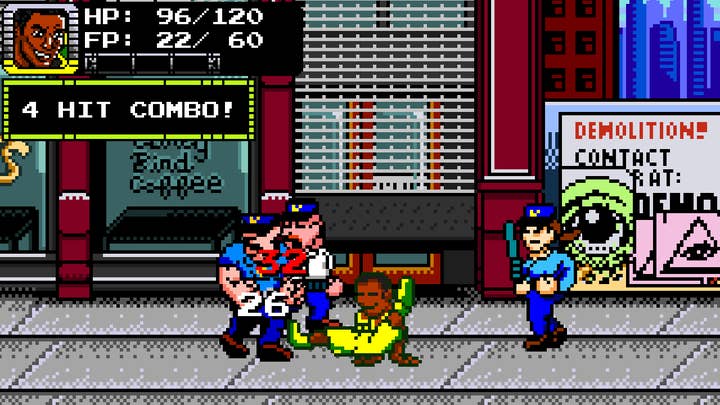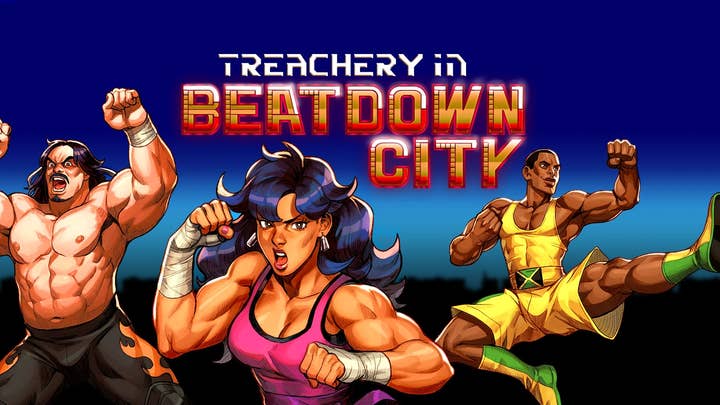The political musings of Treachery in Beatdown City
Developer Shawn Alexander Allen talks about making a retro hybrid beat-'em-up with plenty to say about the world today
For a game with a retro aesthetic, Treachery in Beatdown City is unusually timely.
Released in March, the game pulls deeply from the beat-'em-ups of the '80s and switches up the gameplay with a turn-based twist. It also features a similarly mashed-up approach to narrative, paying homage to games like Bad Dudes and Double Dragon but updating whatever it borrows and personalizing it for the game's designer, artist, and writer Shawn Alexander Allen.
"Bad Dudes' story is that they kidnapped Ronald Reagan and you have to go rescue Ronald Reagan," Allen tells GamesIndustry.biz in a late April interview. "And you could tell that wasn't made by black folks in America because black folks in America would just let Ronald Reagan stay gone. You could tell there's a cultural disconnect there."
In search of something a little more relatable, Allen kicks off the story of Treachery in Beatdown City by having ninjas kidnap a black US president with the not-so-subtle name Blake Orama from East Fulton, the game's thinly veiled version of New York City. After that, East Fulton's police force is disbanded and a private security group is brought in to enforce martial law by billionaire mayor Mike Moneybags -- an even more on-the-nose stand-in for former New York mayor and defeated Democratic primary presidential candidate Michael Bloomberg.
The game's first fight is set in a gym, where a white patron assumes the Puerto Rican boxer Lisa -- one of the game's three protagonists -- is a cleaning lady. She is joined by the undocumented immigrant pro wrestler Brad and rags-to-riches Jeet Kune Do/capoeira practitioner Bruce and from there, the trio pummel their way through trust fund punks, racist preppies, trendy gentrifiers, abusive cops, and other sources of anger.
"People think that politics means telling them what to vote for. But my thing is just that I'm telling a story"
"It's very loud and yelling and obnoxious and in-your-face because it's people who are actually being loud and obnoxious and being in your face and the whole point is you'll fight them," Allen explains.
It would probably qualify as a political game going by contemporary industry standards, but Allen isn't entirely comfortable with that word.
"People think that politics means telling them what to vote for," he says. "But my thing is just that I'm telling a story."
The difference is that from the start, Allen knew he wanted to make a game that would stand out. He wanted it to feature a cool woman who wasn't the weak character, who would star in the center of the cover art rather than being relegated to the corners.
"Our idea of it was this somber, dystopian game in the midst of a real and evolving city with characters that are meant to buck a lot of trends."
While that goal hasn't really changed since the game started development in 2012, the world has, and Treachery in Beatdown City's narrative has changed with it.
The game addresses concepts and conditions that either weren't around or weren't top-of-mind for Allen originally, including the gig economy, apps and how they impact everything from gentrification to dating, the ongoing privatization of public services, corporate participation in the surveillance state, and more. Allen was rewriting the game's script right up until the end of development.

"These are all things that made it in the last few months of script revisions," Allen says. "It didn't change the game much; it changed the flow of conversation and it actually made things make a lot more sense. Like, how do you know all this information about this character? That's fine as a gameplay element, but is it actually ethical for you to have all this information? It ended up making the conversations a bit more sobering, and makes people start wondering a bit more about what the police's role is."
"If you're going to make a game with political musings, I think you should just know what you're talking about"
We ask Allen if he's worried that making Treachery in Beatdown City reflect so much of today's political landscape might make it feel dated in the future. He suggests it's probably impossible to make art that would be timeless.
"Bad Dudes is trapped in its time," he says. "Double Dragon is trapped because it's based on '80s tropes... I don't think anybody looks at Dante's Inferno and says, 'Dante sure dated himself by putting all those Italian politicians in there.'"
He adds, "I don't know if a lot of this stuff is going to change, either. I think adding more intent to it made it stronger. If you're going to make a game with political musings, I think you should just know what you're talking about."
He points to The Fast and the Furious film franchise as one big-budget endeavor that has done well on that front. He notes that it has numerous black and brown lead characters, women in fight scenes that aren't treated as cheesecake, and even a scene dedicated to breaking down the toxic masculinity of one of the characters.
"Those movies have fun and they have their objectifying moments where they're stuck in the old Fast and Furious car culture thing, and they're an amazing mish-mash. The fact that they have Charlize Thereon as the bad guy and she's a white woman with dreads? Someone did that on purpose. They were like, 'Who is the worst person possible?' And it's a misguided anarchist who has dreads on and thinks people are expendable. That's obviously someone saying something."
Allen's game was always going to be political in that sense. It was always going to reflect his own view of the world and his own experiences. And so far, he believes it's absolutely worked as a selling point for the game, with a number of livestreamers and reviewers applauding the catharsis of knocking out Beatdown City's abundance of obnoxious inhabitants.
And if it doesn't click with some people, he doesn't seem worried. He thinks back to when he saw movies like Get Out and Sorry to Bother You, which he described as clearly personal tales by black directors, and how they reassured him he was taking the right approach with Treachery in Beatdown City.
"That helped me say, 'Yeah, cool, you can just keep leaning in because people will either bounce the hell off of it or totally get it.'"










